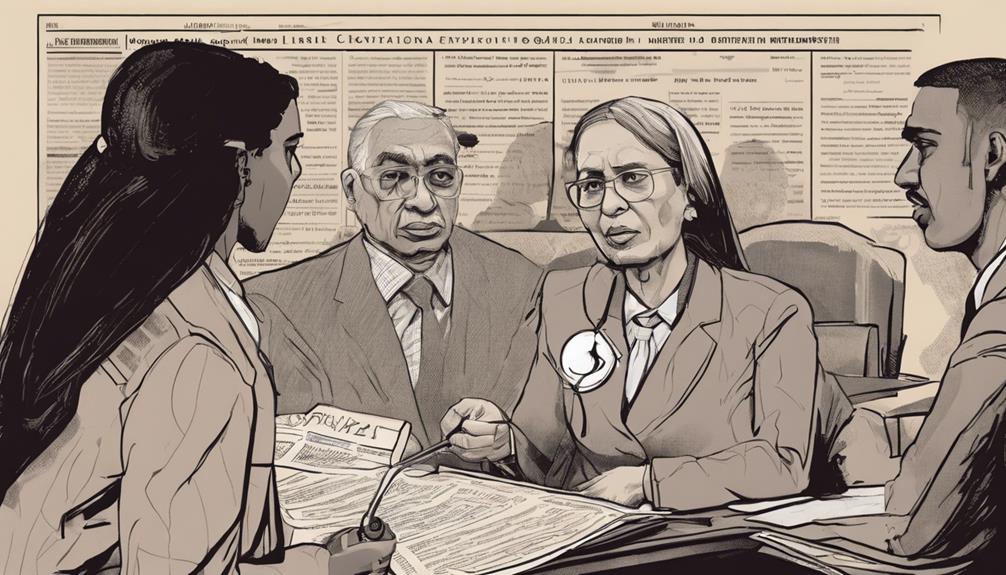When you investigate the print media comments on Ayesha-Faruqi’s physical relations, you’ll find a mix of sensationalism, accusations, speculations, public uproar, and legal implications causing intense debates. The coverage explores the complexities surrounding this controversial topic, shedding light on various perspectives and reactions.
Key Takeaways
- Media reports sensationalized, avoid jumping to conclusions.
- Allegations require fair treatment, presumption of innocence.
- Speculations on motives rampant, skepticism about accusers.
- Public outcry on social media amplifying situation.
- Legal implications anticipated, possibility of criminal charges.
Sensationalism in Reporting

Be cautious of the sensationalism in reporting on the Ayesha-Faruqi physical relations case. Tabloid exaggeration and clickbait headlines have dominated the coverage, leading to a distorted understanding of the situation.
These sensationalized reports often prioritize shock value over accuracy, manipulating readers with dramatic language and misleading narratives.
It is essential to approach these stories with a critical eye, questioning the validity of the information presented. Tabloid exaggeration can take a minor detail and blow it out of proportion, creating a skewed perception of reality.
Clickbait headlines lure readers in with sensational promises, only to deliver shallow content that lacks substance.
When consuming news related to the Ayesha-Faruqi case, be mindful of the source and their intentions. Sensationalized reporting can perpetuate harmful stereotypes and fuel misinformation.
Allegations and Accusations Unveiled
The media recently exposed shocking allegations and accusations surrounding the Ayesha-Faruqi physical relations case. Unfortunately, victim blaming and media bias have played a significant role in the way these allegations have been presented. False accusations and character assassination have been rampant, tarnishing the reputations of those involved without concrete evidence to support such claims.
The public’s importance to jump to conclusions and the media’s enthusiasm to sensationalize the situation have only exacerbated the issue. Instead of seeking the truth, many have been swayed by biased reporting and unfounded accusations. This has led to a dangerous trend where individuals are presumed guilty before being proven innocent.
It is vital to remember that everyone involved in such cases deserves fair treatment and a presumption of innocence until proven otherwise. The media must exercise caution in their reporting to avoid perpetuating false narratives and damaging the lives of those unjustly accused. It’s only through responsible journalism and unbiased investigation that the truth can be uncovered in situations as delicate as this.
Speculations on Motives and Intentions

Speculations abound regarding the motives and intentions behind the unfolding events in the Ayesha-Faruqi physical relations case. Many are questioning the motives that may have led to the allegations being made public.
Some individuals express skepticism about the intentions behind the timing of these accusations, suggesting ulterior motives at play. Doubts have been raised about whether the motives behind the allegations are purely based on seeking justice or if there are other underlying reasons fueling the situation.
People are also scrutinizing the intentions of those involved in bringing these accusations to light. The credibility and sincerity of the individuals making the accusations are being doubted, with concerns raised about hidden agendas or personal vendettas clouding the true intentions behind the allegations.
As the public tries to make sense of the unfolding events, the motives questioned and intentions doubted add layers of complexity to an already contentious situation.
Public Outcry and Social Media Reactions
Public outrage and social media responses have intensified in light of the Ayesha-Faruqi physical relations case. The public backlash against the individuals involved has been swift and strong, with many expressing their shock and disapproval online.
Social media platforms have become inundated with discussions, debates, and criticisms surrounding the incident, leading to a social media frenzy that shows no signs of slowing down.
Users across various social media channels have been sharing their opinions, ranging from calling for accountability and justice to expressing empathy for those affected. The widespread dissemination of information through these platforms has contributed to the rapid spread of the story and the amplification of public sentiments.
As the story continues to unfold, social media users are actively engaging with the case, sharing updates, opinions, and calls to action. The digital sphere has become a battleground of conflicting viewpoints, adding fuel to the fire of public outrage and intensifying the scrutiny on the individuals involved.
Legal Implications and Consequences

What legal ramifications are anticipated in the Ayesha-Faruqi physical relations case? As the situation unfolds, it’s vital to contemplate the potential legal implications and consequences.
Given the sensitive nature of the allegations surrounding Ayesha and Faruqi, there’s a possibility of criminal charges being filed if any unlawful actions are proven to have occurred. Authorities will likely investigate the matter thoroughly to determine if there’s any basis for such charges.
Additionally, there’s a chance that either party could pursue a defamation lawsuit. If false statements have been made that have harmed their reputation, they may seek legal recourse to protect their name and seek damages for any harm caused. Defamation cases can be complex and often involve detailed examination of the statements made and their impact on the individuals involved.
Ethical Journalism and Responsible Reporting
Consider the ethical obligations of journalists and the importance of responsible reporting in the coverage of the Ayesha-Faruqi physical relations case. Media accountability and unbiased reporting are crucial in ensuring that the public receives accurate and fair information. Journalists must adhere to a code of ethics that includes respecting privacy rights and avoiding sensationalism.
| Ethical Journalism | Responsible Reporting |
|---|---|
| Media accountability | Unbiased reporting |
| Privacy rights | Media ethics |
Conclusion
To sum up, let’s aim for fair and transparent reporting in the future to avoid further harm and misinformation in the media’s coverage of Ayesha-Faruqi’s physical relations, which has been filled with sensationalism and speculation.
It’s crucial for journalists to prioritize ethical reporting and responsible journalism when discussing sensitive topics like this.
The public outcry and social media reactions underscore the importance of more thoughtful and considerate media coverage moving forward.